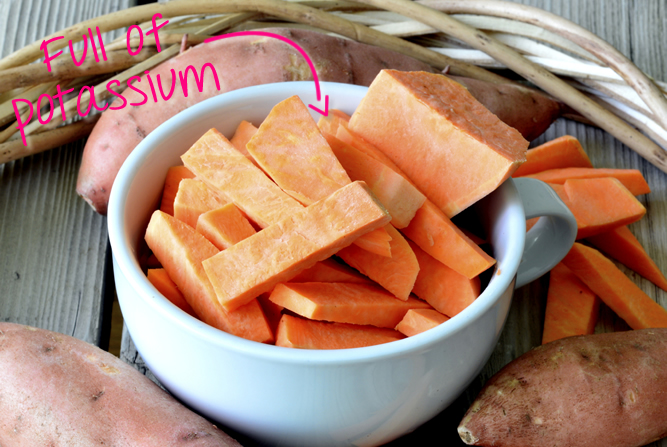Why do we need potassium?

Potassium has many important roles within the body. It is found in all cells in the body, and levels are regulated by the kidneys. It works alongside sodium to maintain a normal blood pressure.
Potassium is known as an electrolyte, and this helps to maintain a healthy balance of fluids in the body. It also helps to transmit electrical pulses to allow for proper nerve and muscle function.
Bone health is maintained with calcium and phosphorous, and it is potassium which regulates the levels of these two minerals. This means that potassium is also essential for strong and healthy bones.
Natural sources of potassium
As potassium is present in almost all fruit, vegetables, meat and fish, it should not be difficult to get all the potassium we need through a healthy and balanced diet. Adults need approximately 3,500 mg of potassium daily.
| Food source | Potassium content (milligrams, mg) |
| 1 sweet potato | 694 |
| 1 baked potato | 610 |
| Chicken, 100g | 450 |
| 1 medium banana | 422 |
| 1 large tomato | 300 |
| 1 tbsp molasses | 295 |
| 1 kiwi | 240 |
| 1 Orange | 237 |
Potassium deficiency
Potassium deficiency is not uncommon, but it often eludes diagnosis. It can have few symptoms to begin with, though mild symptoms of muscle weakness, fatigue, constipation and faintness. It is most common among the elderly, whose kidneys struggle to regulate potassium levels, those on diuretics, or those with eating disorders, such as bulimia.
Potassium deficiency is usually easily corrected by restoring a normal level of potassium into the diet. In particularly severe cases, or in those with complex liver conditions, complications may develop, such as abnormal heart rhythms.
Too much potassium
Normally, if too much potassium is consumed, the kidneys filter it out and it is excreted in the urine, stool or sweat. However, if the kidneys are not as effective at filtering, the excess levels of potassium can accumulate in the body. Too much potassium is called hyperkalemia.
Initial symptoms of hyperkalemia include abdominal cramps, muscle weakness and irritability. Eventually it can lead to inhibition of muscle regulation, and in particular heart problems.





 Looking for our products in a store near you?
Looking for our products in a store near you?
